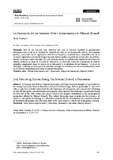Mostrar el registro sencillo del ítem
La formación del ser humano. Sobre el humanismo de Manuel Granell
| dc.creator | Scotton, Paolo | es_ES |
| dc.date.accessioned | 2019-11-12T13:50:17Z | |
| dc.date.available | 2019-11-12T13:50:17Z | |
| dc.date.issued | 2018 | |
| dc.identifier.issn | 1576-4184 | |
| dc.identifier.uri | https://hdl.handle.net/2454/35361 | |
| dc.description.abstract | Uno de los vínculos más estrechos que une la filosofía española al pensamiento latinoamericano reside en la voluntad de construir un saber no exclusivamente teórico, sino también práctico, conectado con la experiencia vital del ser humano y orientado hacia la modificación de la sociedad. Siguiendo el desarrollo del pensamiento liberal español, en particular en relación a sus avatares durante la primera mitad del siglo XX, este artículo analiza la contribución original desarrollada por Manuel Granell a lo largo de su exilio en Venezuela. La discusión crítica de la propuesta de Granell permitirá comprender cómo su ciencia de la vida moral y su ontología del ser humano – es decir su ethología – sentaron las bases para un renovado concepto de filosofía y de educación humanista, tanto en el contexto latinoamericano como en perspectiva global. | es_ES |
| dc.description.abstract | A common trait that ties Spanish philosophy and Latin American thought is represented by the strong connection between theoretical and practical knowledge. Indeed, philosophy is conceived both as a practical activity connected to the life experience of each person, and as means for reforming society. By taking into consideration the development of the Spanish liberal thought, in particular during the first half of the 20th century, this article analyses the original contribution to this philosophical perspective offered by Manuel Granell. This critical discussion aims to point out the relevance of Granell's conception of ethology as a theoretical premise for the development of a renewed concept of humanistic philosophy and education, both in the Latin America context and in the global scenario. | en |
| dc.format.extent | 19 p. | |
| dc.format.mimetype | application/pdf | en |
| dc.language.iso | spa | en |
| dc.publisher | Universidad Complutense de Madrid | en |
| dc.relation.ispartof | Res publica, 21(3) 2018: 497-515 | en |
| dc.rights | Creative Commons Attribution 4.0 International (CC BY 4.0) | en |
| dc.rights.uri | http://creativecommons.org/licenses/by/4.0/ | |
| dc.subject | Filosofía iberoamericana | es_ES |
| dc.subject | Liberalismo | es_ES |
| dc.subject | Educación humanista | es_ES |
| dc.subject | Manuel Granell | es_ES |
| dc.subject | Latin American philosophy | en |
| dc.subject | Liberalism | en |
| dc.subject | Humanistic education | en |
| dc.subject | Manuel Granell | en |
| dc.title | La formación del ser humano. Sobre el humanismo de Manuel Granell | es_ES |
| dc.title.alternative | Educating human being. On Manuel Granell's humanism | en |
| dc.type | info:eu-repo/semantics/article | en |
| dc.type | Artículo / Artikulua | es |
| dc.contributor.department | Ciencias Humanas y de la Educación | es_ES |
| dc.contributor.department | Giza eta Hezkuntza Zientziak | eu |
| dc.rights.accessRights | info:eu-repo/semantics/openAccess | en |
| dc.rights.accessRights | Acceso abierto / Sarbide irekia | es |
| dc.identifier.doi | 10.5209/RPUB.62438 | |
| dc.relation.publisherversion | https://doi.org/10.5209/RPUB.62438 | |
| dc.type.version | info:eu-repo/semantics/publishedVersion | en |
| dc.type.version | Versión publicada / Argitaratu den bertsioa | es |



